Art Fairs
Here Are 9 Treasures That Caught Our Eye at TEFAF Maastricht—From Antique Playing Cards to a Rediscovered Ambrosi Sculpture
Our selections from 7,000 years of art.
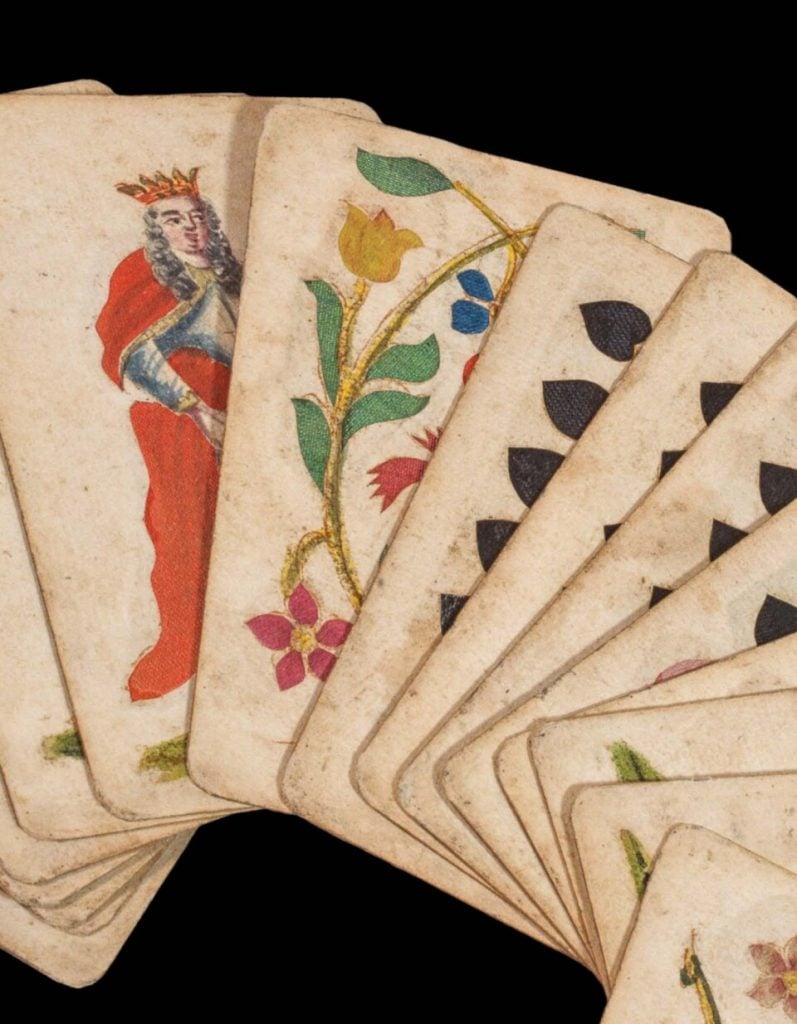
Our selections from 7,000 years of art.

Sarah Cascone

One of the biggest art fairs in the world, TEFAF Maastricht, in its 2023 edition, brought together some 270 dealers from around the world, collectively offering 7,000 years of art history in nearly every conceivable medium, from grand Old Master paintings to African tribal art to fine jewelry. Sifting through the countless gems is an overwhelming proposition, with treasures everywhere you turn your head.
Here are nine of our favorites.
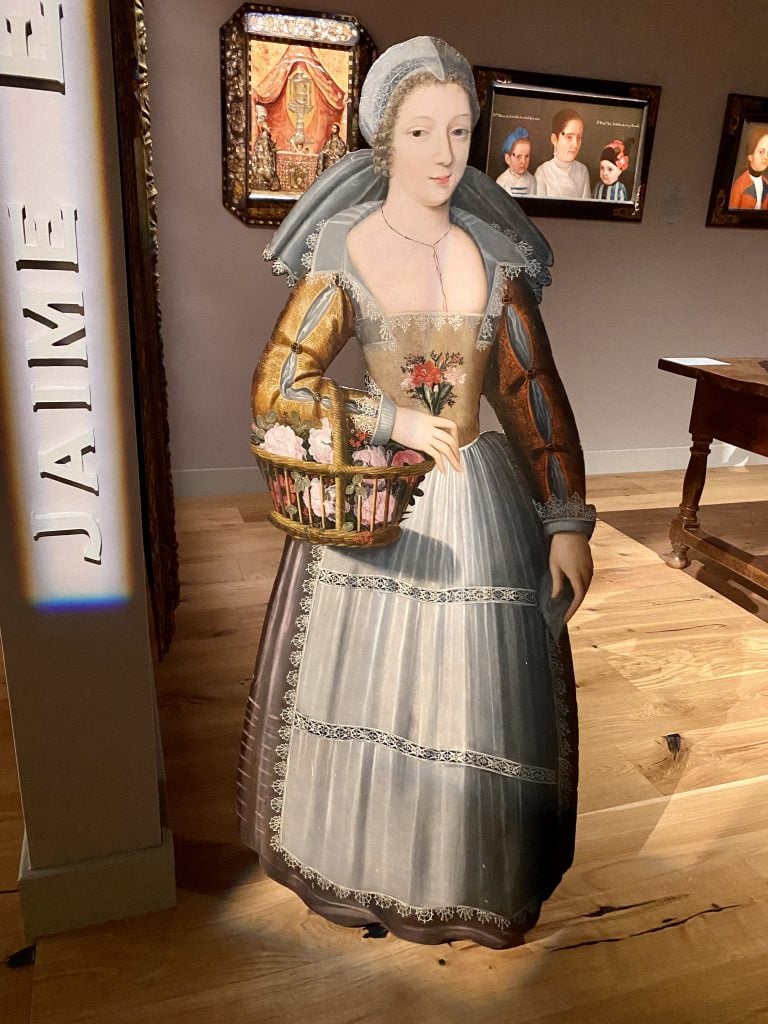
Dummy Board (17th century) from Jaime Eguiguren Art and Antiques, Montevideo, Uruguay, at TEFAF Maastricht, 2023. Photo by Sarah Cascone.
At first glance, you’d be forgiven for thinking that Jaime Eguiguren Art and Antiques has a cardboard cut out at its booth as some kind of Instagram-friendly photo-op.
But instead of a cheap celebrity photo-op, it’s a charming Old Master painting of a young woman clad in an elaborate dress and head garb, carrying a basket full of flowers. If you walk around the figure, you can see the wooden support for the antique work, which is actually a 17th-century French dummy board.
“They were popular in Poland and France,” the gallery’s Vivian Velar told Artnet News. “They were used as decorative motifs in the home, often in front of the fireplace.”
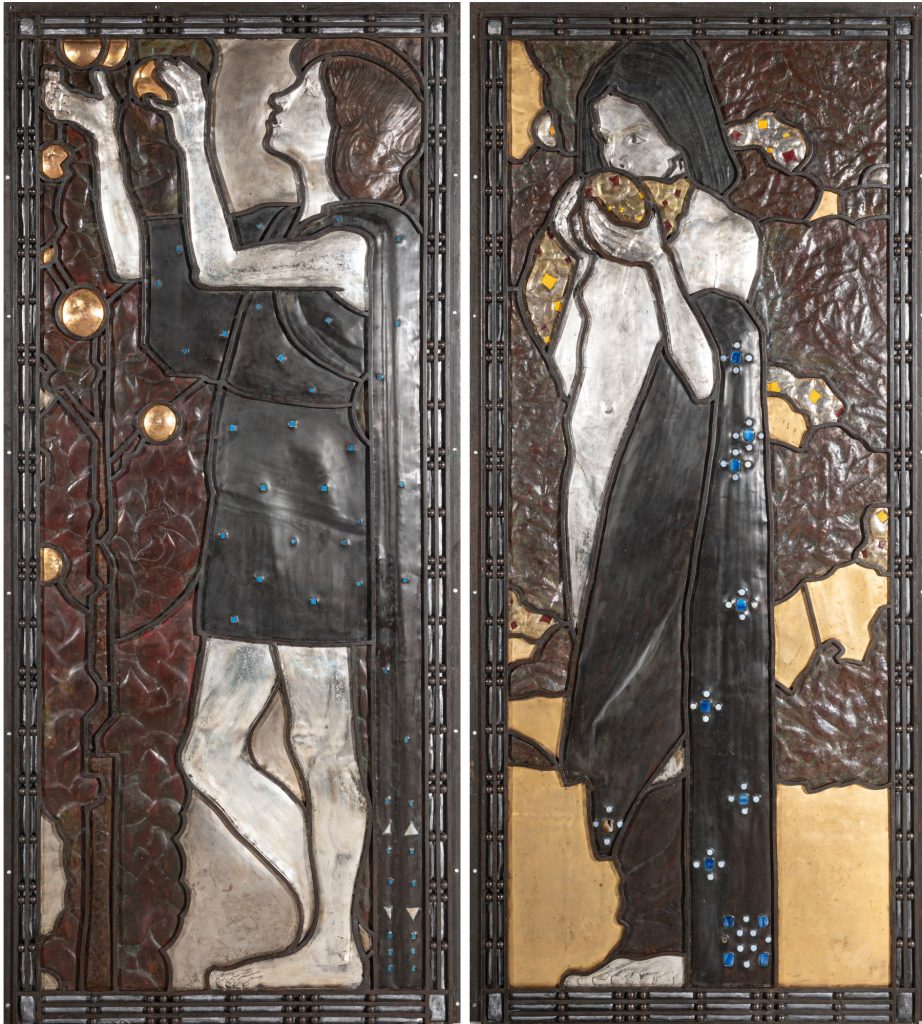
Emma Schlangenhausen and Hilde von Exner, Two Secessionist Panels/Adolescence (1904). Photo courtesy of Bel Etage, Vienna.
A pair of striking copper panels in wrought iron frames represent an intriguing turn-of-the-century collaboration by a pair of women artists, Emma Schlangenhausen and Hilde von Exner.
“They were students of Kolomon Moser,” Christiane Gastl of Bel Etage in Vienna told Artnet News. The two created the pair of artworks at the Vienna School of Arts and Crafts, for the institution’s room at the Austrian pavilion at the 1904 World’s Fair in St. Louis, Missouri.
Both panels depict a young woman, featuring gilding and silver plating adorned with opalescent glass and enameled cabochons.
Tantalizingly, little is known about either artist. Schlangenhausen went on to work as a graphic artist, but Von Exner died fairly young, at just 42, leaving behind few known works.
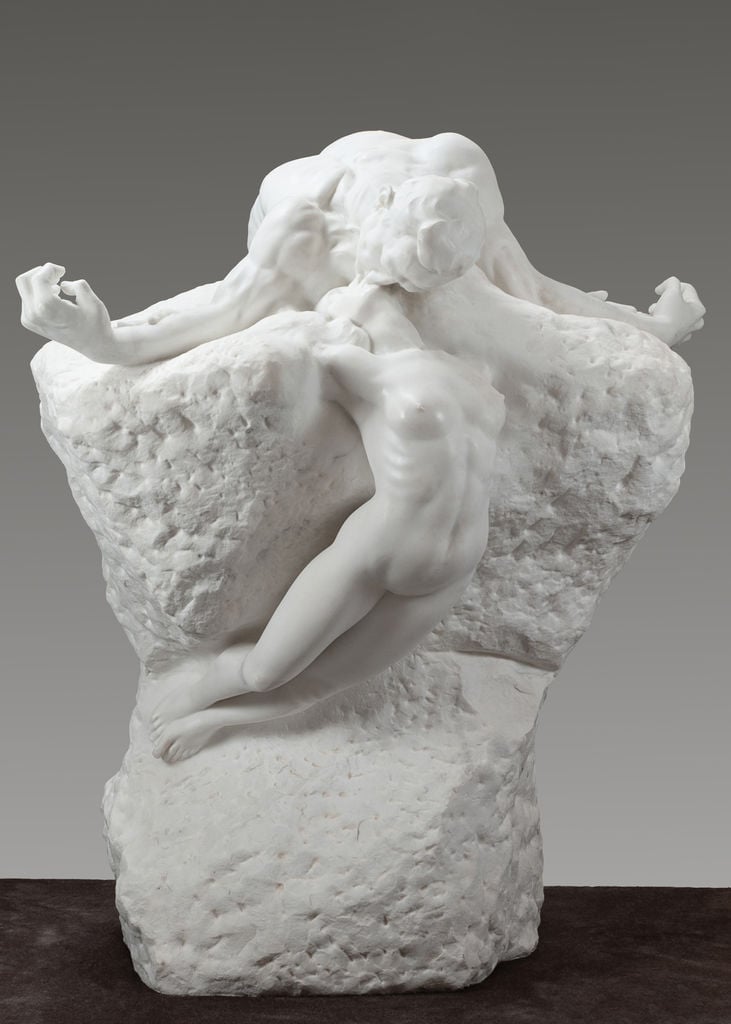
Gustinus Ambrosi, Promethindenlos or The Eternal Longing (1928). Photo courtesy of Bowman Sculpture, London.
TEFAF is full of showstoppers, but one of the servers actually paused in her tracks and asked me if I could read her the label for this large-scale marble work, as she wasn’t able to step inside the booth with her tray of empty wine glasses. Instead, I offered to hold it for her, so she could experience the piece in the round—Prometheus arching backwards to give a naked woman a passionate kiss, both bodies partially embedded in the Carrara marble as if struggling to break free.
“I love Prometheus with his chains, and I love the fact that here, she is the chain. It’s just the most romantic piece,” Michele Bowman of London’s Bowman Sculpture told Artnet News.
The gallery recently restored the awesome work, which was discovered hidden in a cellar for safekeeping from the Nazis. It’s a smaller version of a sculpture Ambrosi carved from 31-ton block of marble that is in the collection of the Belvedere in Vienna. It’s on public view at the fair for only the second time, following a recent exhibition at Bowman.
The artist, known as the Austrian Rodin, was a former child prodigy in music who turned to sculpture after a bout of measles left him deaf. “Being an artistic soul, he started to sketch and draw and moved on from there,” Bowman added. “So little of his work comes on the market, so when it does, normally we buy it.”
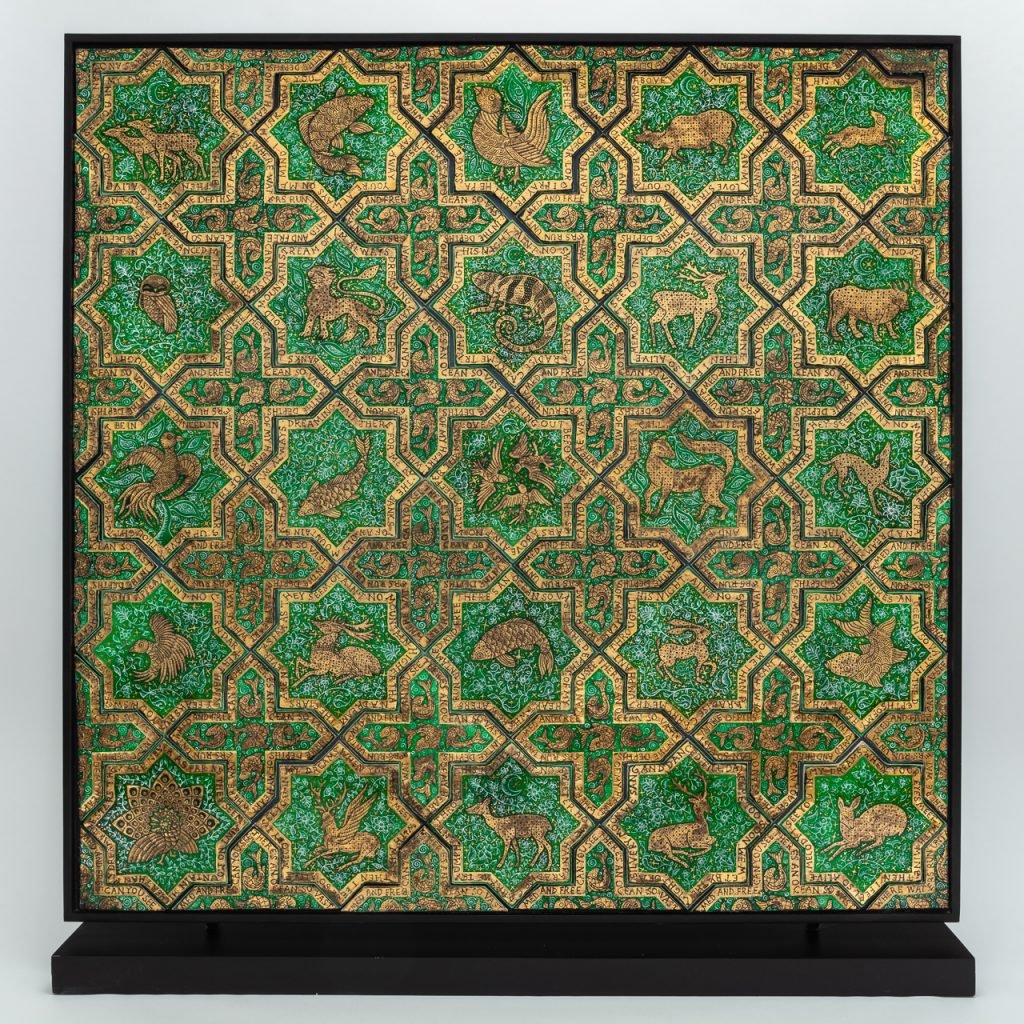
Boris Aldridge, The Green Forest Panel No. 1 (2022). Photo courtesy of Amir Mohtashemi, London.
The juxtaposition of contemporary works with TEFAF’s legendary antiques can yield some of the fair’s brightest moments, such as a large ceramic wall panel by Boris Aldridge amid the historic Indian and Islamic art at the booth of London’s Amir Mohtashemi.
“Boris is a British potter influenced by Persian art,” the dealer told Artnet News, pointing to the artist’s own poetry lining the glistening green and gold tiles, which are painted with intricate animal designs.
Alridge is the only contemporary artist that the gallery works with, but Mohtashemi sees plenty of overlap with their other holdings.
“We really look at him as the continuation of the arts and craft movement in the U.K.,” he added.
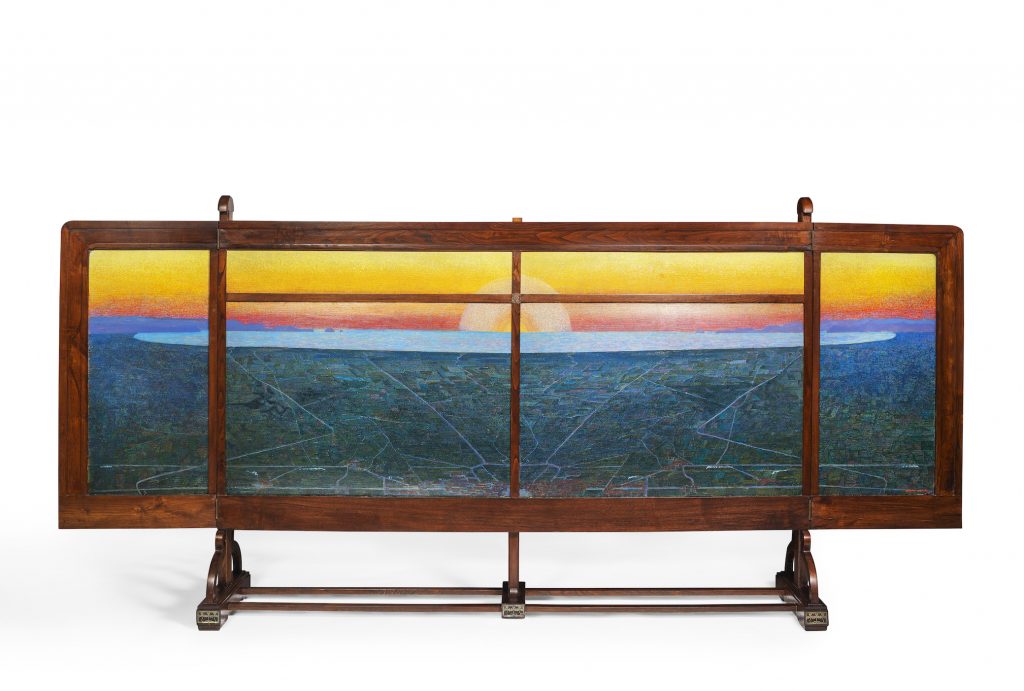
Giuseppe Viner, Divisionist Triptych (1902). Photo courtesy of Oscar Graf, Paris and London.
An especially stunning and unique work at the fair is the wooden room divider by Giuseppe Viner, painted with a gorgeous sunset view of the Tuscan countryside and the Mediterranean coast as seen from the artist’s villa outside Sienna.
Dealer Oscar Graf doesn’t sell paintings, but this work neatly bridges the divide between furniture and the canvas, with the two outer panels of the triptych folding in to reveal painted doors on the back side.
“This is what we call artist furniture—what painters and sculptors would make for themselves, not as part of their regular practice,” he told Artnet News. “And this is 10 or 15 years ahead of its time—we’re on the way to Futurist and Divisionist Italian painting.”
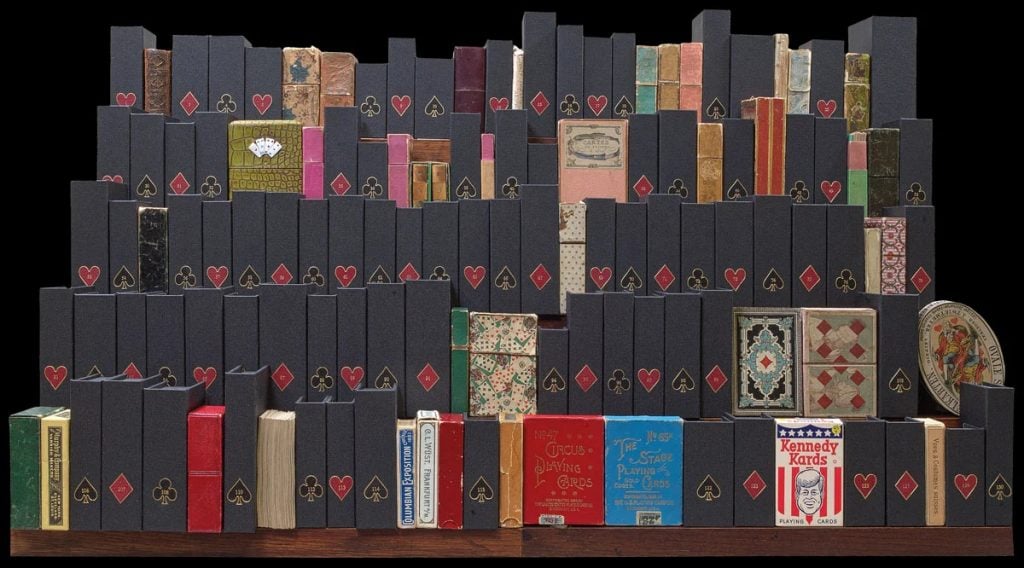
Selections from Frank van den Bergh’s playing card collection. Photo courtesy of Daniel Crouch Rare Books, London.
A substantial portion of Daniel Crouch Rare Books’ booth was dedicated to 157 decks of cards owned by Frank van den Bergh. He has been perhaps the world’s leading collector of playing cards since 1990.
“It’s 30 years of work, but my children don’t want to continue the collection so what do you do?” Van den Bergh told Artnet News.
The asking price for the collection, which Crouch has packaged in attractive matching boxes for the occasion, comes out to about $75 a card—but that average includes much more valuable decks, like an embroidered one from 1680 that alone would cost €75,000. (The gallery has released a catalogue, titled The Art of the Deal, detailing the collection.)
There are also a few single cards, such as a 1795 “foundling card” that Van den Berge dubbed the “most emotional” of the collection.
“If a mother abandoned a child, she left a playing card and she cut off a corner of the card. She would keep the other part so she could prove that it was her child,” he said. “Here, she writes on the back ‘my burden is heavy. Goodbye my dear Famke,’ which is a Dutch name meaning ‘little girl.’ It’s just a single card, it’s dirty, but it has a very emotional background.”
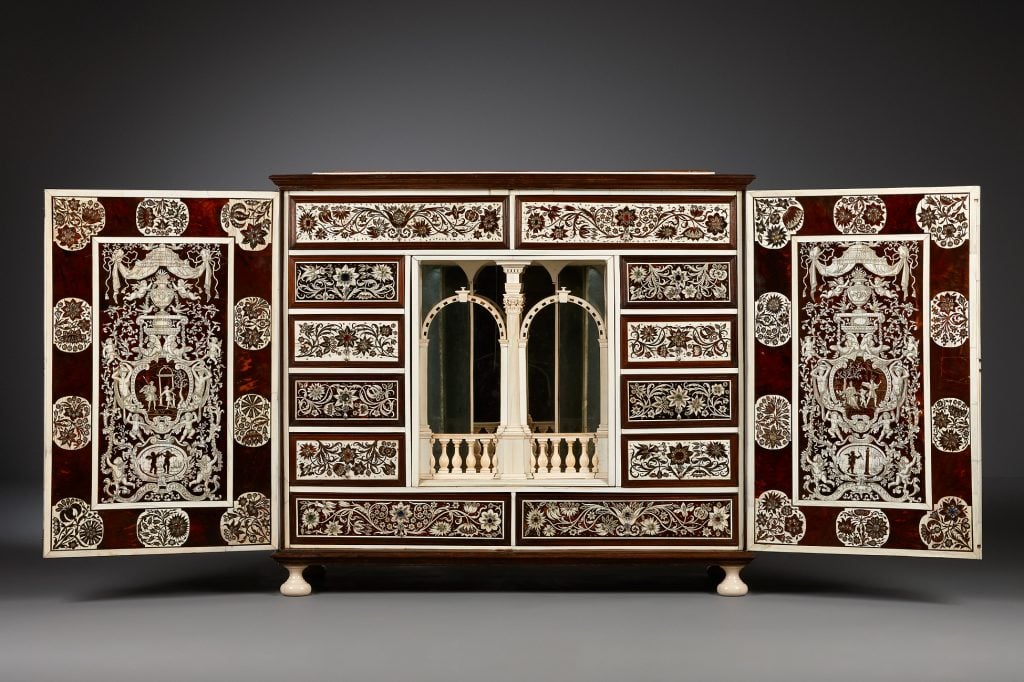
Joachim Tielke, Collectors cabinet (ca. 1700). Photo courtesy of Kollenburg Antiquairs, Oirschot, the Netherlands.
This is the only known cabinet by Joachim Tielke, who is recognized as one of the 17th and 18th century’s greatest instrument makers. Assembling the intricate piece, carved from solid ivory and inlaid with ornate designs in tortoiseshell and mother of pearl, would have served as an advertisement of the artist’s skill as a craftsman—and a showpiece in his Hamburg shop.
The work was identified thanks to the diary of a book collector, in which he described visiting Tielke and being impressed by the cabinet, with its many drawers and hidden compartments.
Finding the right collector to take home this unique piece, Renee Louwers of Kollenburg Antiquairs told Artnet News, could be a challenge: “The people who collect Tielke’s guitars, they are not usually looking for an expensive piece of furniture!”
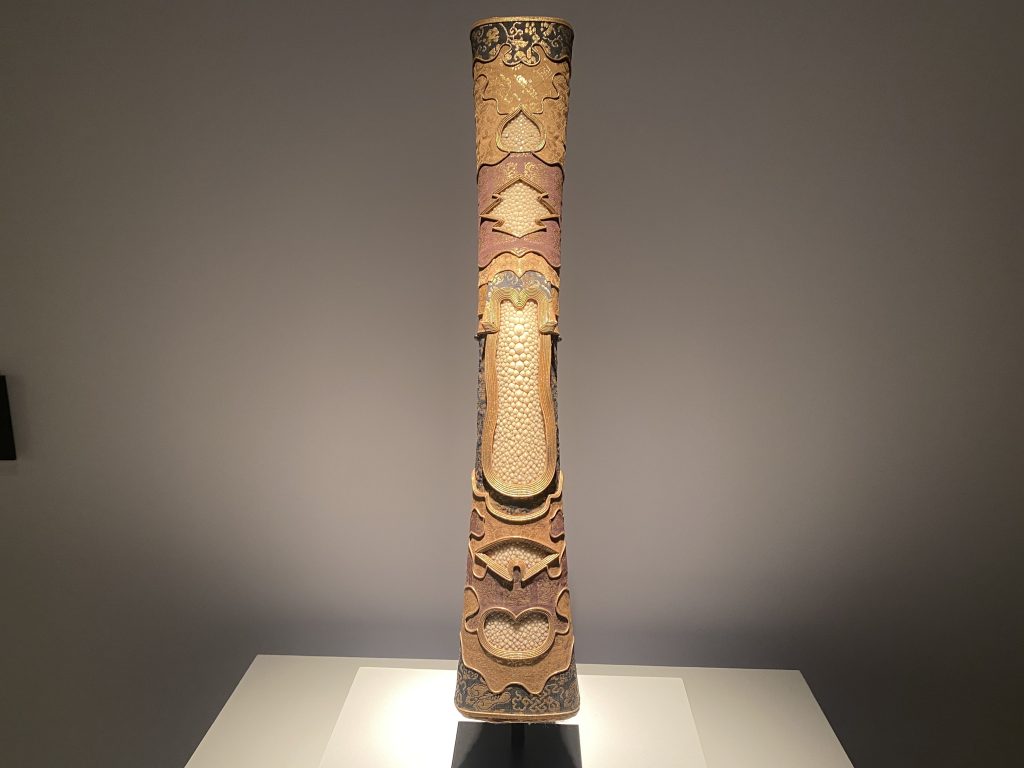
Kazari Zame (19th century) from Galerie Jean-Christophe Charbonnier, Paris, at TEFAF Maastricht 2023. Photo by Sarah Cascone.
In a fair full of rarities, a 19th-century Japanese Kazari Zame, a decoratively bound roll shagreen, or ray skin, stood out. Traditionally given as gifts among the daimyô, or Japanese feudal lords, these luxurious packages could have been displayed—or opened so the skin could be applied to a sword hilt.
“When you are packing something like this, it’s really, really precious,” gallery owner Jean-Christophe Charbonnier told Artnet News. “This one, we are very lucky that it hasn’t been unpacked.”
Only two other intact versions are known to survive, one of which is in the collection of New York’s Metropolitan Museum of Art. The other has been in private hands since being auctioned at Christie’s in 1992. The ray skin is mounted in high quality brocade, with several openings to show off the grain of the skin within.
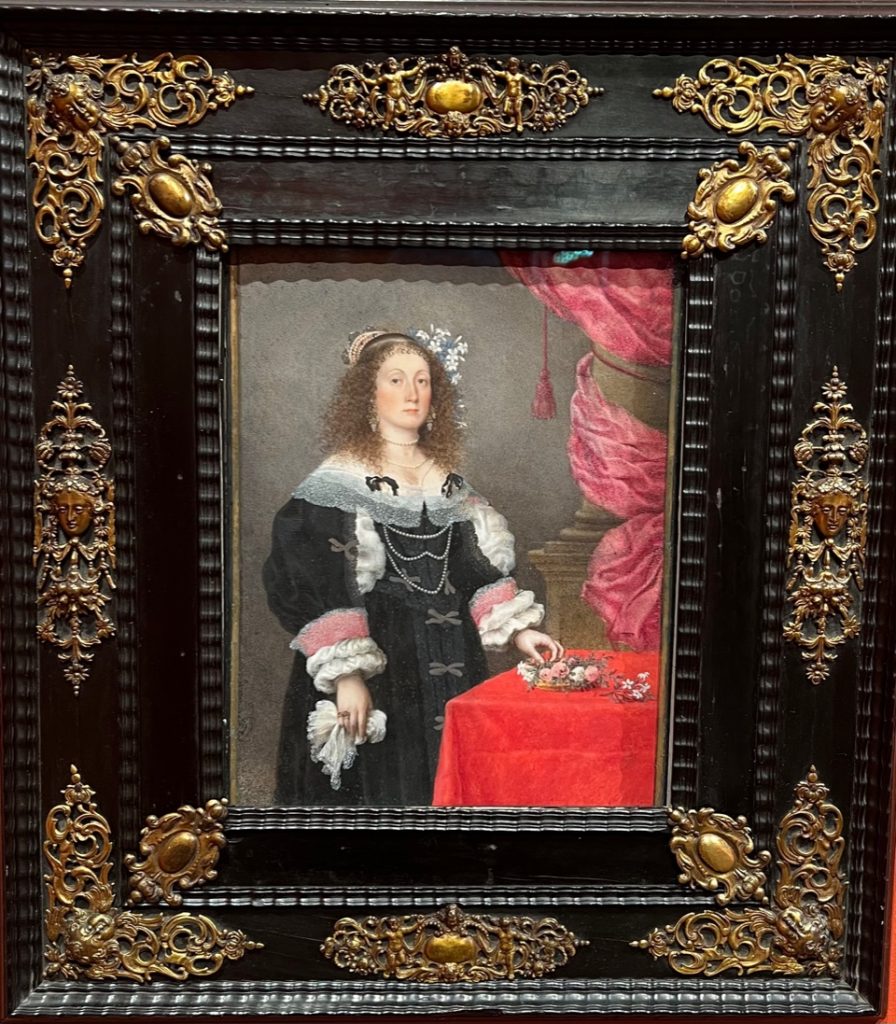
Maddalena Corvina, Portrait of a Lady of High Standing (ca. 1635–1645). Photo courtesy of Miriam di Penta Fine Art, Rome.
This is a newly discovered painting by the obscure 17th-century Italian miniaturist Maddalena Corvina.
“She was well-known in her time. We have portraits of her, and 17th-century historians talk about her work,” dealer Miriam di Penta told Artnet News. “She never married, in order to continue her profession.”
Corvina was successful, too—her mother’s will lists jewelry and other valuables purchases as being made thanks to her daughter’s career as an artist.
The gouache on paper work on view at TEFEF, which hails from a private collection in France, joins only two or three known works by the artist. Likely painted for a betrothal, it is also in the best condition of any extant Corvina.
“The others are more faded; they’ve suffered from light,” Di Penta said.
The only previous auction results from the artist, according to the Artnet Price Database, were in 2019, for €12,260 ($13,596) and in 1998, for £2,760 ($4,519)—but an eagle-eyed buyer still snapped up this much more expensive example day one of the fair.
TEFAF Maastricht is on view at the Maastricht Exhibition and Conference Centre (MECC), Forum 100, 6229 GV Maastricht, Netherlands, from March 9–19, 2023.